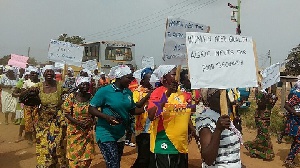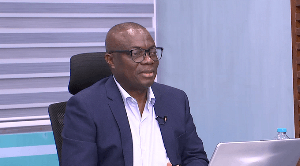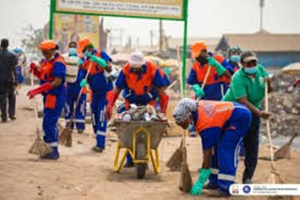Women, living in rural areas, have been known to play a critical role in the enhancement of the rural economies in the country.
As the World celebrates the role of rural women on October 15, I set out to some rural cocoa growing communities in the Eastern, Central and Ashanti regions of Ghana to find out how women there are impacting their communities and participating in child labour elimination.
“Mpuntuo adesua oye Mpuntuo adesua oye Se me hunu akenkan m'eni begye Se me hunu akyerew a m'eni begye Se me hunu akontaa bu kaho di3 a m'awie Mpuntuo adesua oye”
To wit, "learning for development is good; if I am able to read I will be happy; if I am able to write I will be happy; and if I am able to calculate mathematically, then I have it all; learning for development is good."
I chanced on an all women adult literacy class at Assin Ninkyiso joyfully singing these lyrics during one of their lesson periods. The lyrics in the song describe people who have come to realise and accept that education is key to development and that it is not too late to become literate. The women, between the ages of 28 and 65, and whose main work is farming, exhibited that they were eager to acquire for themselves knowledge in reading, writing and calculations.
“We did not have the opportunity to go to school; we could not read nor write. Now we hope to take this literacy class until we become literate. With literacy we can also contribute meaningfully to the development of our society and we are eager to achieve that, said 64-year-old rice farmer, Margret Amoako.
Assin Ninkyiso is a rural community in the Assin North District of the Central Region with a population of 589 adults and 505 children. Hitherto, the community lacked basic amenities and child labour was high there.
Now it has access to portable water and schools from kindergarten to the primary School level because the community, especially the women, purposed to hold themselves up to develop their community.
To the women, they cannot see the desired development if they, including their children, are not educated. They have therefore relegated child labour and all its forms to the background and now jealously maintaining child protection. They ensure that their wards are in school when they should be and also make sure that they do not engage in activities that are identified as child labour.
Agartha Wereko, a mother of four also acknowledged that the women efforts to learning, protecting children and improving economically in Assin Ninkyiso were assisted by an NGO called International Cocoa Initiative (ICI).
According to information, the ICI since September, 2015, has trained and equipped Community Child Protection Committee members to carry out periodic awareness raising exercises about child protection in cocoa growing communities.
Through its Community Action Plan implementation processes, the ICI has also assisted women to cultivate acres of rice, maize, cassava and pepper farms as part of the communities Internally Generated Activities (IGA). The NGO has also built classroom blocks in some of the communities including Assin Ninkyiso to enhance teaching and learning environment.
Assin Ninkyiso is not the only rural community that has its women thriving to enhance their standard of living as well as ensure a child labour free society.
Mpaem is a simple farming community located near Akwadum in the New Juabeng Municipality with a population of 845. Women in this community number about 300 and are into farming and petty trading. Some of the women I interacted with gave me the impression that despite some economic and social challenges, they were working hard at achieving economic freedom.
The women here told me that they wished to see their children become responsible and prominent personalities in the world and are therefore making sure that the children attain the necessary levels of education.
Similarly, women at Dossi in Assin South, Agyekuhene Akura in New Juaben and Yaw Boadi in the Ahafo North District of Ashanti Region, have overlooked their immediate barriers such as deplorable roads, lack of health centres and markets to stay out of poverty.
At Dossi for instance, the women are engaged in Gari and palm oil processing. Incidentally, the ICI has worked in all these communities for which the women show appreciation to at the least opportunity.
"I have five children and all what I did for a living was subsistence farming. As a result I could hardly raise money to cater for myself and my children's education.
"Thanks to an NGO called ICI that came to offer us training on how to add value to our produce for sale. They also encouraged us not to engage our children in hard labour. I took that advantage and it has been beneficial to me as well as my colleague women. We are now able to make some money to run ourselves and to settle our wards education needs," a 43-year-old single mother at Mpaem said.
According to her, with the right and adequate support, their next generations would be better off. "While we are equipped with skills, our children will be educated and with the help of God, life will be more bearable."
The Former United Nations (UN) Secretary-General, Ban Ki-moon in 2016 stated that "The 2030 Agenda for Sustainable Development promises to leave no one behind. To deliver on that, we must help rural women to thrive, and to access the support and information they need, so that they can fulfil their potential without leaving their communities."
Women in these communities are thriving. I realised they received some support from NGOs to break free from subsistence living. However, existing infrastructure challenges as bad roads continue to be a hindrance.
Goal nine of the Sustainable Development Goals expects nations to build resilient infrastructure, promote sustainable industrialization and foster innovation which are crucial to empowering communities.
Taking opportunity to enlighten the rural women, who had no knowledge about the SDGs, in the communities I visited, they expressed hope to be part of the success story of the Agenda 2030 "but we need good roads, health posts and educational facilities before," one of them stressed.
In an interview, the New Juaben Municipal Chief Executive, Mrs. Comfort Asante, assured that government's promises and its plans have rural women's needs at core. She said rural women mattered most in the socio-economic progress of the nation and that the Assembly would ensure they get their due.
The theme for the 2017 International Day for Rural Women celebration is "Challenges and opportunities in climate-resilient agriculture for gender equality and the empowerment of rural women and girls."
Rural women must be celebrated, but they will feel more celebrated if resilient infrastructure is accessible to them.
Opinions of Sunday, 15 October 2017
Columnist: McAnthony Dagyenga















